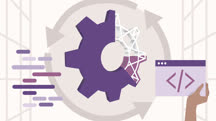Course catalog
Categories
Showing 7,701-7,720 of 9,136 items.
Social Selling Foundations: Using Content to Drive Engagement
Do social selling right. Learn how to maximize engagement on Facebook, LinkedIn, and Twitter by sharing more compelling, targeted content.
Social Selling with LinkedIn
Learn how to use LinkedIn for social selling. Connect with your target market, engage with prospects, and develop relationships with buyers.
Social Selling with Salesforce
Learn how to manage social selling with Salesforce. Build a network of customers and contacts by listening and sharing on social media.
Social Selling: Reaching Prospects (227576)
Social media illuminates the people and experiences that connect you and your ideal customers. Business leaders who might have once seemed out of reach are now only a few clicks away. In this course, sales professional and prospecting coach Miles Croft shows how to leverage this power to connect with new prospects, explaining how to build a social selling strategy that helps you increase connections and sales opportunities. Miles steps through how to analyze your product to determine who your ideal customers are, and then review your own network, LinkedIn, and other platforms and websites to find prospects. He explains how to analyze your targets and zero in on commonalities between you and your potential customers. Plus, Miles covers options for approaching your targets, including how to build rapport using your connections.
Social Success at Work
Discover how to build the social skills you need to succeed at work.
Soft Skills for Information Security Professionals
Information security isn’t all ones and zeros. Learn how to communicate security concepts and proposals in terms that will resonate with audiences of all technical abilities.
Soft Skills for Sales Professionals
Learn how to build your soft sales skills to better connect with—and ultimately sell to—your customers.
Software Architecture Foundations
Learn how software architecture can help you build better software. Review the role of the software architect, key theories and concepts, and common architectural patterns.
Software Architecture: Domain-Driven Design
Get a practical overview of domain-driven design (DDD), an essential architectural process. Learn how to use DDD to develop a microservice or other domain-focused system.
Software Architecture: From Developer to Architect (220997)
How is a software architect different from a developer? What exactly do architects usually do, and what additional skills would you need to become one? Instructor Lee Atchison answers these questions and more as he introduces you to thinking like an architect. Whereas a developer focuses on details, an architect’s role requires letting go of the details in order to guide the process. A good architect evaluates proposed designs and methodologies and provides feedback to keep the big picture and all outside needs in mind. Lee walks you through a day in the life of the architect, which lets you see the roles that architects may fill for themselves and others. The modern architect needs to keep several principles in mind, and Lee discusses each one. He covers additional skills you need to develop to become a successful software architect, then concludes by walking you through how to discuss with your current manager your goal of becoming an architect.
Software Architecture: Patterns for Developers
Learn how to apply the correct architecture to new systems and recognize patterns in existing systems.
Software Design: Code and Design Smells
Ensure that your code is effective, understandable, and flexible by identifying and avoiding code and design smells.
Software Design: Developing Effective Requirements
Getting the requirements right in software development is half the battle. In this course, learn about the techniques and tools needed to win that battle.
Software Design: From Requirements to Release
Follow along with the full life-cycle implementation of a software project, from requirements development to modeling, design, coding, and testing.
Software Design: Modeling with UML
Discover how to use Unified Modeling Language (UML) diagrams to create important artifacts at each stage of the software development life cycle.
Software Development Life Cycle (SDLC)
Review a variety of different SDLC approaches—from traditional methods to more modern processes—and learn about their applicability in software development.
Software Project Management Foundations
Learn about software development project management including systems and tools.
Software Testing Foundations: Bug Writing and Management
Write better bugs. Learn best practices for identifying, documenting, and tracking issues discovered during software testing.
Software Testing Foundations: Continuous Testing and DevOps
Learn the essentials of continuous testing. Explores tools and techniques for running automated tests in a continuous integration pipeline and incorporating DevOps into QA.
Software Testing Foundations: Test Management
Learn the best practices and processes involved in effectively managing a quality test.



















